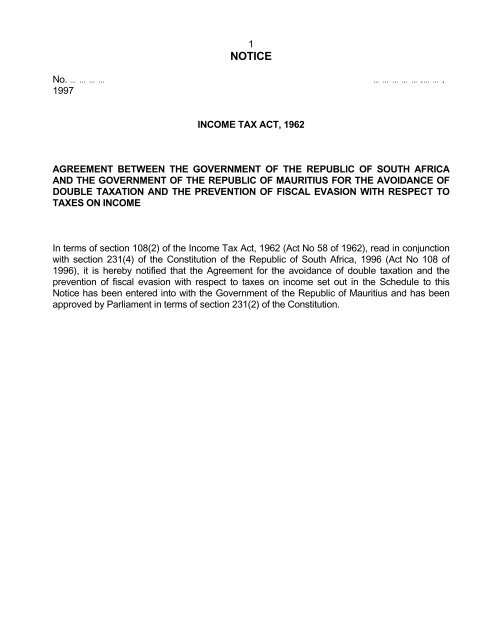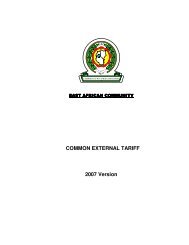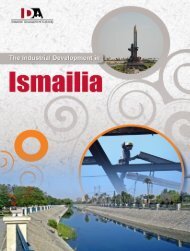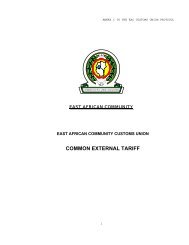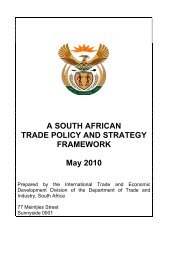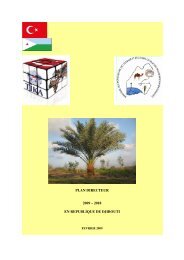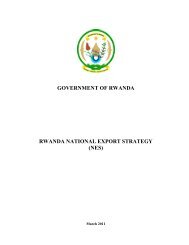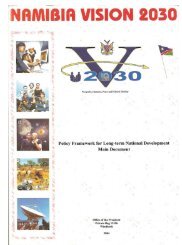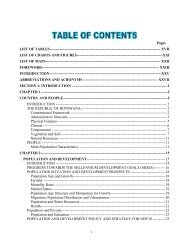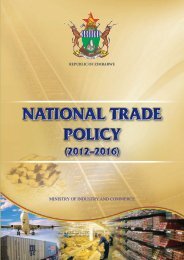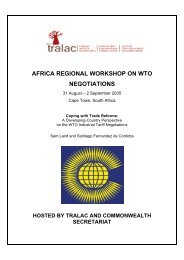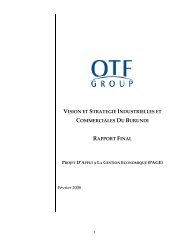Mauritius Agreement - tralac â trade law centre
Mauritius Agreement - tralac â trade law centre
Mauritius Agreement - tralac â trade law centre
Create successful ePaper yourself
Turn your PDF publications into a flip-book with our unique Google optimized e-Paper software.
1<br />
NOTICE<br />
No. …………<br />
1997<br />
…………….… ….<br />
INCOME TAX ACT, 1962<br />
AGREEMENT BETWEEN THE GOVERNMENT OF THE REPUBLIC OF SOUTH AFRICA<br />
AND THE GOVERNMENT OF THE REPUBLIC OF MAURITIUS FOR THE AVOIDANCE OF<br />
DOUBLE TAXATION AND THE PREVENTION OF FISCAL EVASION WITH RESPECT TO<br />
TAXES ON INCOME<br />
In terms of section 108(2) of the Income Tax Act, 1962 (Act No 58 of 1962), read in conjunction<br />
with section 231(4) of the Constitution of the Republic of South Africa, 1996 (Act No 108 of<br />
1996), it is hereby notified that the <strong>Agreement</strong> for the avoidance of double taxation and the<br />
prevention of fiscal evasion with respect to taxes on income set out in the Schedule to this<br />
Notice has been entered into with the Government of the Republic of <strong>Mauritius</strong> and has been<br />
approved by Parliament in terms of section 231(2) of the Constitution.
2<br />
SCHEDULE<br />
AGREEMENT BETWEEN THE GOVERNMENT OF THE REPUBLIC OF SOUTH AFRICA<br />
AND THE GOVERNMENT OF THE REPUBLIC OF MAURITIUS FOR THE AVOIDANCE OF<br />
DOUBLE TAXATION AND THE PREVENTION OF FISCAL EVASION WITH RESPECT TO<br />
TAXES ON INCOME<br />
The Government of the Republic of South Africa and the Government of the Republic of<br />
<strong>Mauritius</strong> desiring to promote and strengthen the economic relations between the two countries,<br />
Have agreed as follows:<br />
Article 1<br />
Personal Scope<br />
This <strong>Agreement</strong> shall apply to persons who are residents of one or both of the Contracting<br />
States.<br />
Article 2<br />
Taxes Covered<br />
1. This <strong>Agreement</strong> shall apply to taxes on income imposed on behalf of a Contracting State<br />
or its political subdivisions, irrespective of the manner in which they are levied.<br />
2. There shall be regarded as taxes on income all taxes imposed on total income or on<br />
elements of income.<br />
3. The existing taxes to which this <strong>Agreement</strong> shall apply are in particular:<br />
(a)<br />
in <strong>Mauritius</strong>, the income tax;<br />
(hereinafter referred to as "<strong>Mauritius</strong> tax");<br />
(b)<br />
in South Africa:<br />
(i)<br />
(ii)<br />
the normal tax; and<br />
the secondary tax on companies;<br />
(hereinafter referred to as "South African tax").<br />
4. This <strong>Agreement</strong> shall also apply to any other taxes of a substantially similar character<br />
which are imposed by either Contracting State after the date of signature of this <strong>Agreement</strong> in<br />
addition to, or in place of, the existing taxes. The competent authorities of the Contracting<br />
States shall notify each other of any substantial changes which have been made in their<br />
respective taxation <strong>law</strong>s.
3<br />
Article 3<br />
General Definitions<br />
1. In this <strong>Agreement</strong>, unless the context otherwise requires:<br />
(a)<br />
(b)<br />
(c)<br />
(d)<br />
(e)<br />
(f)<br />
(g)<br />
(h)<br />
(i)<br />
(j)<br />
the term "<strong>Mauritius</strong>" means the Republic of <strong>Mauritius</strong> and includes:<br />
(i) all the territories and islands which, in accordance with the <strong>law</strong>s of<br />
<strong>Mauritius</strong>, constitute the State of <strong>Mauritius</strong>;<br />
(ii) the territorial sea of <strong>Mauritius</strong>; and<br />
(iii) any area outside the territorial sea of <strong>Mauritius</strong> which in accordance with<br />
international <strong>law</strong> has been or may hereafter be designated, under the <strong>law</strong>s<br />
of <strong>Mauritius</strong>, as an area, including the Continental Shelf, within which the<br />
rights of <strong>Mauritius</strong> with respect to the sea, the sea bed and sub-soil and<br />
their natural resources may be exercised;<br />
the term "South Africa" means the Republic of South Africa and, when used in a<br />
geographical sense, includes:<br />
(i) the territorial sea of South Africa; and<br />
(ii) any area outside the territorial sea, including the Continental Shelf, which<br />
has been or may hereafter be designated, under the <strong>law</strong>s of South Africa,<br />
as an area within which South Africa may exercise sovereign rights or<br />
jurisdiction;<br />
the terms "a Contracting State" and "the other Contracting State" mean <strong>Mauritius</strong><br />
or South Africa as the context requires;<br />
the term "company" means any body corporate or any entity which is treated as a<br />
company or body corporate for tax purposes;<br />
the term "competent authority" means:<br />
(i) in <strong>Mauritius</strong>, the Commissioner of Income Tax or his authorised<br />
representative; and<br />
(ii) in South Africa, the Commissioner for Inland Revenue or his authorised<br />
representative;<br />
the terms "enterprise of a Contracting State" and "enterprise of the other<br />
Contracting State" mean respectively an enterprise carried on by a resident of a<br />
Contracting State and an enterprise carried on by a resident of the other<br />
Contracting State;<br />
the term "international traffic" means any transport by a ship or aircraft operated<br />
by an enterprise which has its place of effective management in a Contracting<br />
State, except when the ship or aircraft is operated solely between places in the<br />
other Contracting State;<br />
the term "national" means any individual having the citizenship of a Contracting<br />
State and any legal person, partnership, association or other entity deriving its<br />
status as such from the <strong>law</strong>s in force in a Contracting State;<br />
the term "person" includes an individual, a company and any other body of<br />
persons which is treated as an entity for tax purposes; and<br />
the term "tax" means <strong>Mauritius</strong> tax or South African tax as the context requires.
4<br />
2. In the application of the provisions of this <strong>Agreement</strong> by a Contracting State, any term<br />
not otherwise defined shall, unless the context otherwise requires, have the meaning which it<br />
has under the <strong>law</strong>s of that State relating to the taxes which are the subject of this <strong>Agreement</strong>.<br />
1. For the purposes of this <strong>Agreement</strong>:<br />
Article 4<br />
Resident<br />
(a)<br />
(b)<br />
the term "resident of <strong>Mauritius</strong>" means any person who, under the <strong>law</strong>s of that<br />
State, is liable to tax therein by reason of his domicile, residence, place of<br />
management or any other criterion of a similar nature. This term does not include<br />
any person who is liable to tax in <strong>Mauritius</strong> in respect only of income from sources<br />
in <strong>Mauritius</strong>; and<br />
the term "resident of South Africa" means any individual who is ordinarily resident<br />
in South Africa and any legal person which has its place of management in South<br />
Africa.<br />
2. Where by reason of the provisions of paragraph 1 of this Article an individual is a<br />
resident of both Contracting States, then his status shall be determined in accordance with the<br />
following rules:<br />
(a)<br />
(b)<br />
(c)<br />
(d)<br />
he shall be deemed to be a resident of the State in which he has a permanent<br />
home available to him. If he has a permanent home available to him in both<br />
States, he shall be deemed to be a resident of the State with which his personal<br />
and economic relations are closer (<strong>centre</strong> of vital interests);<br />
if the State in which he has his <strong>centre</strong> of vital interests cannot be determined, or if<br />
he does not have a permanent home available to him in either State, he shall be<br />
deemed to be a resident of the State in which he has an habitual abode;<br />
if he has an habitual abode in both States or in neither of them, he shall be<br />
deemed to be a resident of the State of which he is a national;<br />
if he is a national of both States or of neither of them, the competent authorities of<br />
the Contracting States shall settle the question by mutual agreement.<br />
3. Where by reason of the provisions of paragraph 1 of this Article a person other than an<br />
individual is a resident of both Contracting States, then it shall be deemed to be a resident of<br />
the State in which its place of effective management is situated.<br />
Article 5<br />
Permanent Establishment<br />
1. For the purposes of this <strong>Agreement</strong>, the term "permanent establishment" means a fixed<br />
place of business through which the business of the enterprise is wholly or partly carried on.
2. The term "permanent establishment" shall include:<br />
5<br />
(a)<br />
(b)<br />
(c)<br />
(d)<br />
(e)<br />
(f)<br />
(g)<br />
(h)<br />
a place of management;<br />
a branch;<br />
an office;<br />
a factory;<br />
a workshop;<br />
a warehouse, in relation to a person providing storage facilities for others;<br />
a mine, an oil or gas well, a quarry or any other place of extraction of natural<br />
resources; and<br />
an installation or structure used for the exploration of natural resources.<br />
3. A building site or a construction, installation or assembly project, or supervisory activities<br />
in connection therewith, constitutes a permanent establishment only if the site, project or activity<br />
lasts more than nine months.<br />
4. Notwithstanding the preceding provisions of this Article, the term "permanent<br />
establishment" shall be deemed not to include:<br />
(a)<br />
(b)<br />
(c)<br />
(d)<br />
(e)<br />
(f)<br />
the use of facilities solely for the purpose of storage, display or delivery of goods<br />
or merchandise belonging to the enterprise;<br />
the maintenance of a stock of goods or merchandise belonging to the enterprise<br />
solely for the purpose of storage, display or delivery;<br />
the maintenance of a stock of goods or merchandise belonging to the enterprise<br />
solely for the purpose of processing by another enterprise;<br />
the maintenance of a fixed place of business solely for the purpose of purchasing<br />
goods or merchandise, or for collecting information, for the enterprise;<br />
the maintenance of a fixed place of business solely for the purpose of advertising,<br />
for the supply of information, for scientific research or for similar activities which<br />
have a preparatory or auxiliary character, for the enterprise; and<br />
the maintenance of a fixed place of business solely for any combination of<br />
activities mentioned in subparagraphs (a) to (e), provided that the overall activity<br />
of the fixed place of business resulting from this combination is of a preparatory or<br />
auxiliary character.<br />
5. Notwithstanding the provisions of paragraphs 1 and 2 of this Article, a person acting in a<br />
Contracting State on behalf of an enterprise of the other Contracting State (other than an agent<br />
of an independent status to whom paragraph 6 of this Article applies) notwithstanding that he<br />
has no fixed place of business in the first-mentioned State shall be deemed to be a permanent<br />
establishment in that State if:<br />
(a)<br />
(b)<br />
he has, and habitually exercises, a general authority in the first-mentioned State<br />
to conclude contracts in the name of the enterprise, unless his activities are<br />
limited to the purchase of goods or merchandise for the enterprise; or<br />
he maintains in the first-mentioned State a stock of goods or merchandise<br />
belonging to the enterprise from which he regularly fills orders on behalf of the<br />
enterprise.
6<br />
6. An enterprise shall not be deemed to have a permanent establishment in a Contracting<br />
State merely because it carries on business in that State through a broker, general commission<br />
agent or any other agent of an independent status, provided that such persons are acting in the<br />
ordinary course of their business.<br />
7. The fact that a company which is a resident of a Contracting State controls or is<br />
controlled by a company which is a resident of the other Contracting State, or which carries on<br />
business in that other State (whether through a permanent establishment or otherwise), shall<br />
not of itself constitute either company a permanent establishment of the other.<br />
Article 6<br />
Income from Immovable Property<br />
1. Income derived by a resident of a Contracting State from immovable property, including<br />
income from agriculture or forestry, is taxable in the Contracting State in which such property is<br />
situated.<br />
2. The term "immovable property" shall have the meaning which it has under the <strong>law</strong> of the<br />
Contracting State in which the property in question is situated. The term shall in any case<br />
include property accessory to immovable property, livestock and equipment used in agriculture<br />
and forestry, rights to which the provisions of general <strong>law</strong> respecting landed property apply,<br />
usufruct of immovable property and rights to variable or fixed payments as consideration for the<br />
working of, or the right to work, mineral deposits, sources and other natural resources. Ships,<br />
boats and aircraft shall not be regarded as immovable property.<br />
3. The provisions of paragraph 1 of this Article shall apply to income derived from the direct<br />
use, letting or use in any other form of immovable property.<br />
4. The provisions of paragraphs 1 and 3 of this Article shall also apply to the income from<br />
immovable property of an enterprise and to income from immovable property used for the<br />
performance of independent personal services.<br />
Article 7<br />
Business Profits<br />
1. The profits of an enterprise of a Contracting State shall be taxable only in that State<br />
unless the enterprise carries on business in the other Contracting State through a permanent<br />
establishment situated therein. If the enterprise carries on business as aforesaid, the profits of<br />
the enterprise may be taxed in the other State but only so much of them as is attributable to that<br />
permanent establishment.
7<br />
2. Subject to the provisions of paragraph 3 of this Article, where an enterprise of a<br />
Contracting State carries on business in the other Contracting State through a permanent<br />
establishment situated therein, there shall in each Contracting State be attributed to that<br />
permanent establishment the profits which it might be expected to make if it were a distinct and<br />
separate enterprise engaged in the same or similar activities under the same or similar<br />
conditions and dealing wholly independently with the enterprise of which it is a permanent<br />
establishment.<br />
3. In determining the profits of a permanent establishment, there shall be allowed as<br />
deductions expenses which are incurred for the purposes of the permanent establishment<br />
including executive and general administrative expenses so incurred, whether in the<br />
Contracting State in which the permanent establishment is situated or elsewhere. However, no<br />
such deduction shall be allowed in respect of amounts, if any, paid (otherwise than towards<br />
reimbursement of actual expenses) by the permanent establishment to the head office of the<br />
enterprise or any of its other offices, by way of royalties, fees or other similar payments in return<br />
for the use of patents or other rights, or by way of commission, for specific services performed<br />
or for management, or, except in the case of a banking enterprise, by way of interest on moneys<br />
lent to the permanent establishment. Likewise, no account shall be taken, in determining the<br />
profits of a permanent establishment, of amounts charged (otherwise than towards<br />
reimbursement of actual expenses), by the permanent establishment to the head office of the<br />
enterprise or any of its other offices, by way of royalties, fees or other similar payments in return<br />
for the use of patents or other rights, or by way of commission for specific services performed or<br />
for management, or, except in the case of a banking enterprise, by way of interest on moneys<br />
lent to the head office of the enterprise or any of its other offices.<br />
4. In so far as it has been customary in a Contracting State to determine the profits to be<br />
attributed to a permanent establishment on the basis of an apportionment of the total profits of<br />
the enterprise to its various parts, nothing in paragraph 2 of this Article shall preclude that<br />
Contracting State from determining the profits to be taxed by such an apportionment as may be<br />
customary. The method of apportionment adopted shall, however, be such that the result shall<br />
be in accordance with the principles contained in this Article.<br />
5. No profits shall be attributed to a permanent establishment by reason of the mere<br />
purchase by that permanent establishment of goods or merchandise for the enterprise.<br />
6. For the purposes of the preceding paragraphs of this Article, the profits to be attributed to<br />
the permanent establishment shall be determined by the same method year by year unless<br />
there is good and sufficient reason to the contrary.<br />
7. Where profits include items of income which are dealt with separately in other Articles of<br />
this <strong>Agreement</strong>, then the provisions of those Articles shall not be affected by the provisions of<br />
this Article.
8<br />
Article 8<br />
Shipping and Air Transport<br />
1. Profits of an enterprise from the operation or rental of ships or aircraft in international<br />
traffic and the rental of containers and related equipment which is incidental to the operation of<br />
ships or aircraft in international traffic shall be taxable only in the Contracting State in which the<br />
place of effective management of the enterprise is situated.<br />
2. If the place of effective management of a shipping enterprise is aboard a ship or boat,<br />
then it shall be deemed to be situated in the Contracting State in which the home harbour of the<br />
ship or boat is situated, or, if there is no such home harbour, in the Contracting State of which<br />
the operator of the ship or boat is a resident.<br />
3. The provisions of paragraph 1 of this Article shall also apply to profits from the<br />
participation in a pool, a joint business or an international operating agency.<br />
1. Where:<br />
Article 9<br />
Associated Enterprises<br />
(a)<br />
(b)<br />
an enterprise of a Contracting State participates directly or indirectly in the<br />
management, control or capital of an enterprise of the other Contracting State; or<br />
the same persons participate directly or indirectly in the management, control or<br />
capital of an enterprise of a Contracting State and an enterprise of the other<br />
Contracting State,<br />
and in either case conditions are made or imposed between the two enterprises in their<br />
commercial or financial relations which differ from those which would be made between<br />
independent enterprises, then any profits which would, but for those conditions, have<br />
accrued to one of the enterprises, but, by reason of those conditions, have not so<br />
accrued, may be included in the profits of that enterprise and taxed accordingly.<br />
2. Where a Contracting State includes in the profits of an enterprise of that State - and<br />
taxes accordingly - profits on which an enterprise of the other Contracting State has been<br />
charged to tax in that other State and the profits so included are profits which would have<br />
accrued to the enterprise of the first-mentioned State if the conditions made between the two<br />
enterprises had been those which would have been made between independent enterprises,<br />
then that other State shall make an appropriate adjustment to the amount of the tax charged<br />
therein on those profits. In determining such adjustment, due regard shall be had to the other<br />
provisions of this <strong>Agreement</strong> and the competent authorities of the Contracting States shall if<br />
necessary consult each other.
9<br />
Article 10<br />
Dividends<br />
1. Dividends paid by a company which is a resident of a Contracting State to a resident of<br />
the other Contracting State may be taxed in that other State.<br />
2. However, such dividends may also be taxed in the Contracting State of which the<br />
company paying the dividends is a resident and according to the <strong>law</strong>s of that State, but if the<br />
recipient is the beneficial owner of the dividends, the tax so charged to the beneficial owner<br />
shall not exceed:<br />
(a)<br />
(b)<br />
5 per cent of the gross amount of the dividends if the beneficial owner is a<br />
company which holds at least 10 per cent of the capital of the company paying<br />
the dividends;<br />
15 per cent of the gross amount of the dividends in all other cases.<br />
The competent authorities of the Contracting States shall settle the mode of application<br />
of these limitations by mutual agreement.<br />
This paragraph shall not affect the taxation of the company in respect of the profits out of<br />
which the dividends are paid.<br />
3. The term "dividends" as used in this Article means income from shares or other rights<br />
(not being debt-claims) participating in profits, as well as income from other corporate rights<br />
which is subjected to the same taxation treatment as income from shares by the <strong>law</strong>s of the<br />
Contracting State of which the company making the distribution is a resident.<br />
4. The provisions of paragraphs 1 and 2 of this Article shall not apply if the beneficial owner<br />
of the dividends, being a resident of a Contracting State, carries on business in the other<br />
Contracting State of which the company paying the dividends is a resident, through a<br />
permanent establishment situated therein, or performs in that other State independent personal<br />
services from a fixed base situated therein, and the holding in respect of which the dividends<br />
are paid is effectively connected with such permanent establishment or fixed base. In such a<br />
case, the provisions of Article 7 or Article 14, as the case may be, shall apply.<br />
5. Where a company which is a resident of a Contracting State derives profits or income<br />
from the other Contracting State, no tax may be imposed on the beneficial owner in that other<br />
State on the dividends paid by the company except in so far as such dividends are paid to a<br />
resident of that other State or in so far as the holding in respect of which the dividends are paid<br />
is effectively connected with a permanent establishment or a fixed base situated in that other<br />
State, nor subject the company's undistributed profits to a tax on undistributed profits, even if<br />
the dividends paid or the undistributed profits consist wholly or partly of profits or income arising<br />
in such other State.
10<br />
Article 11<br />
Interest<br />
1. Interest arising in a Contracting State and paid to a resident of the other Contracting<br />
State shall be taxable only in that other State, provided such resident is the beneficial owner of<br />
the interest.<br />
2. The term "interest" as used in this Article means income from debt-claims of every kind,<br />
whether or not secured by mortgage and whether or not carrying a right to participate in the<br />
debtor's profits, and in particular, income from government securities and income from bonds or<br />
debentures, including premiums and prizes attaching to such securities, bonds or debentures.<br />
Penalty charges for late payment shall not be regarded as interest for the purposes of this<br />
Article. The term "interest" shall not include any item which is treated as a dividend under the<br />
provisions of Article 10 of this <strong>Agreement</strong>.<br />
3. The provisions of paragraph 1 of this Article shall not apply if the beneficial owner of the<br />
interest, being a resident of a Contracting State, carries on business in the other Contracting<br />
State in which the interest arises, through a permanent establishment situated therein, or<br />
performs in that other State independent personal services from a fixed base situated therein,<br />
and the debt-claim in respect of which the interest is paid is effectively connected with such<br />
permanent establishment or fixed base. In such a case, the provisions of Article 7 or Article 14,<br />
as the case may be, shall apply.<br />
4. Where, by reason of a special relationship between the payer and the beneficial owner<br />
or between both of them and some other person, the amount of the interest, having regard to<br />
the debt-claim for which it is paid, exceeds the amount which would have been agreed upon by<br />
the payer and the beneficial owner in the absence of such relationship, the provisions of this<br />
Article shall apply only to the last-mentioned amount. In such a case, the excess part of the<br />
payments shall remain taxable according to the <strong>law</strong>s of each Contracting State, due regard<br />
being had to the other provisions of this <strong>Agreement</strong>.<br />
Article 12<br />
Royalties<br />
1. Royalties arising in a Contracting State and paid to a resident of the other Contracting<br />
State shall be taxable only in that other State if such resident is the beneficial owner of the<br />
royalties.<br />
2. The term "royalties" as used in this Article means payments of any kind received as a<br />
consideration for the use of, or the right to use, any copyright of literary, artistic or scientific work<br />
(including cinematograph films and films, tapes or discs for radio or television broadcasting),<br />
any patent, <strong>trade</strong> mark, design or model, computer programme, plan, secret formula or process,<br />
or for the use of, or the right to use, information concerning industrial, commercial or scientific<br />
experience.
11<br />
3. The provisions of paragraph 1 of this Article shall not apply if the beneficial owner of the<br />
royalties, being a resident of a Contracting State, carries on business in the other Contracting<br />
State in which the royalties arise, through a permanent establishment situated therein, or<br />
performs in that other State independent personal services from a fixed base situated therein,<br />
and the right or property in respect of which the royalties are paid is effectively connected with<br />
such permanent establishment or fixed base. In such a case, the provisions of Article 7 or<br />
Article 14, as the case may be, shall apply.<br />
4. Where, by reason of a special relationship between the payer and the beneficial owner<br />
or between both of them and some other person, the amount of the royalties paid, having regard<br />
to the use, right or information for which they are paid, exceeds the amount which would have<br />
been agreed upon by the payer and the beneficial owner in the absence of such relationship,<br />
the provisions of this Article shall apply only to the last-mentioned amount. In such a case, the<br />
excess part of the payments shall remain taxable according to the <strong>law</strong>s of each Contracting<br />
State, due regard being had to the other provisions of this <strong>Agreement</strong>.<br />
Article 13<br />
Capital Gains<br />
1. Gains derived by a resident of a Contracting State from the alienation of immovable<br />
property referred to in Article 6 and situated in the other Contracting State may be taxed in that<br />
other State.<br />
2. Gains from the alienation of movable property forming part of the business property of a<br />
permanent establishment which an enterprise of a Contracting State has in the other<br />
Contracting State or of movable property pertaining to a fixed base available to a resident of a<br />
Contracting State in the other Contracting State for the purpose of performing independent<br />
personal services, including such gains from the alienation of such a permanent establishment<br />
(alone or with the whole enterprise) or of such fixed base, may be taxed in that other State.<br />
3. Gains from the alienation of ships or aircraft operated in international traffic or movable<br />
property pertaining to the operation of such ships or aircraft, shall be taxable only in the<br />
Contracting State in which the place of effective management of the enterprise is situated.<br />
4. Gains from the alienation of any property other than that referred to in paragraphs 1, 2<br />
and 3, shall be taxable only in the Contracting State of which the alienator is a resident.
12<br />
Article 14<br />
Independent Personal Services<br />
1. Income derived by a resident of a Contracting State in respect of professional services or<br />
other activities of an independent character shall be taxable only in that State unless he has a<br />
fixed base regularly available to him in the other Contracting State for the purpose of performing<br />
his activities. If he has such a fixed base, the income may be taxed in the other State but only<br />
so much of it as is attributable to that fixed base.<br />
2. The term "professional services" includes especially independent scientific, literary,<br />
artistic, educational or teaching activities as well as the independent activities of physicians,<br />
<strong>law</strong>yers, engineers, architects, dentists and accountants.<br />
Article 15<br />
Dependent Personal Services<br />
1. Subject to the provisions of Articles 16, 18, 19, 20 and 21, salaries, wages and other<br />
similar remuneration derived by a resident of a Contracting State in respect of an employment<br />
shall be taxable only in that State unless the employment is exercised in the other Contracting<br />
State. If the employment is so exercised, such remuneration as is derived therefrom may be<br />
taxed in that other State.<br />
2. Notwithstanding the provisions of paragraph 1 of this Article, remuneration derived by a<br />
resident of a Contracting State in respect of an employment exercised in the other Contracting<br />
State shall be taxable only in the first-mentioned State if:<br />
(a)<br />
(b)<br />
(c)<br />
the recipient is present in the other State for a period or periods not exceeding in<br />
the aggregate 183 days in the calendar year concerned; and<br />
the remuneration is paid by or on behalf of an employer who is not a resident of<br />
the other State; and<br />
the remuneration is not borne by a permanent establishment or a fixed base<br />
which the employer has in the other State.<br />
3. Notwithstanding the preceding provisions of this Article, remuneration in respect of an<br />
employment exercised aboard a ship or aircraft operated in international traffic may be taxed in<br />
the Contracting State in which the place of effective management of the enterprise is situated.
13<br />
Article 16<br />
Directors' Fees<br />
Directors' fees and other similar payments derived by a resident of a Contracting State in his<br />
capacity as a member of the board of directors of a company which is a resident of the other<br />
Contracting State may be taxed in that other State.<br />
Article 17<br />
Entertainers and Sportsmen<br />
1. Notwithstanding the provisions of Articles 14 and 15, income derived by entertainers<br />
such as theatre, motion picture, radio or television artistes, and musicians, or by sportsmen,<br />
from their personal activities as such, may be taxed in the Contracting State in which these<br />
activities are exercised.<br />
2. Where income in respect of personal activities exercised by an entertainer or a<br />
sportsman in his capacity as such accrues not to the entertainer or sportsman himself but to<br />
another person, that income may, notwithstanding the provisions of Articles 7, 14 and 15, be<br />
taxed in the Contracting State in which the activities of the entertainer or sportsman are<br />
exercised.<br />
3. The provisions of paragraphs 1 and 2 of this Article shall not apply to income derived as<br />
aforesaid if the activities of the entertainer or sportsman in the Contracting State are supported<br />
wholly or mainly out of public funds of the other Contracting State or a political subdivision or<br />
local authority thereof.<br />
Article 18<br />
Pensions and Annuities<br />
1. Any pension (other than a pension of the kind referred to in paragraph 2 of Article 19)<br />
and any annuity, derived from sources within a Contracting State by an individual who is a<br />
resident of the other Contracting State and is subject to tax on the whole or portion thereof in<br />
the other State, shall be exempt from tax in the first-mentioned State to the extent that it is<br />
subjected to tax in the other State.<br />
2. The term "annuity" as used in this Article means a stated sum payable periodically at<br />
stated times, during life or during a specified or ascertainable period of time, under an obligation<br />
to make the payments in return for adequate and full consideration in money or money's worth.<br />
3. Notwithstanding the provisions of paragraph 1 of this Article, pensions paid and other<br />
payments made under a public scheme which is part of the social security system of a<br />
Contracting State or a political subdivision or a local authority thereof shall be taxable only in<br />
that State.
14<br />
Article 19<br />
Government Service<br />
1. (a) Remuneration, other than a pension, paid by, or out of funds created by, one of<br />
the Contracting States or a political subdivision, local authority or statutory body thereof to an<br />
individual in respect of services rendered to that State or subdivision, authority or body in the<br />
discharge of governmental functions shall be taxable only in that State.<br />
(b) However, such remuneration shall be taxable only in the other Contracting State if<br />
the services are rendered in that other State and the individual is a resident of that State who:<br />
(i)<br />
(ii)<br />
is a national of that State; or<br />
did not become a resident solely for the purpose of rendering the services.<br />
2. (a) Any pension paid by, or out of funds created by, a Contracting State or a political<br />
subdivision, local authority or statutory body thereof to an individual in respect of services<br />
rendered to that State or subdivision, authority or body in the discharge of governmental<br />
functions shall be taxable only in that State.<br />
(b) However, such pension shall be taxable only in the other Contracting State if the<br />
individual is a resident and a national of that State.<br />
3. The provisions of Articles 15, 16 and 18 shall apply to remuneration and pensions in<br />
respect of services rendered in connection with a business carried on by a Contracting State or<br />
a political subdivision, local authority or statutory body thereof.<br />
Article 20<br />
Students and Business Apprentices<br />
A student or business apprentice who is present in a Contracting State solely for the purpose<br />
of his education or training and who is, or immediately before being so present was, a resident<br />
of the other Contracting State, shall be exempt from tax in the first-mentioned State on<br />
payments received from outside that first-mentioned State for the purposes of his maintenance,<br />
education or training.<br />
Article 21<br />
Professors and Teachers<br />
1. Notwithstanding the provisions of Article 15, a professor or teacher who makes a<br />
temporary visit to one of the Contracting States for a period not exceeding two years for the<br />
purpose of teaching or carrying out research at a university, college, school or other educational<br />
institution in that State and who is, or immediately before such visit was, a resident of the other<br />
Contracting State shall, in respect of remuneration for such teaching or research, be exempt<br />
from tax in the first-mentioned State, provided that such remuneration is derived by him from<br />
outside that State and such remuneration is subject to tax in the other State.
15<br />
2. The provisions of this Article shall not apply to income from research if such research is<br />
undertaken not in the public interest but wholly or mainly for the private benefit of a specific<br />
person or persons.<br />
Article 22<br />
Other Income<br />
1. Subject to the provisions of paragraph 2 of this Article, items of income of a resident of a<br />
Contracting State, wherever arising, not dealt with in the foregoing Articles of this <strong>Agreement</strong> in<br />
respect of which he is subject to tax in that State, shall be taxable only in that State.<br />
2. The provisions of paragraph 1 shall not apply to income if the recipient of such income,<br />
being a resident of a Contracting State, carries on business in the other Contracting State<br />
through a permanent establishment situated therein, or performs in that other State independent<br />
personal services from a fixed base situated therein, and a right or property in respect of which<br />
the income is paid is effectively connected with such permanent establishment or fixed base. In<br />
such a case, the provisions of Article 7 or Article 14, as the case may be, shall apply.<br />
Article 23<br />
Elimination of Double Taxation<br />
1. Double taxation shall be eliminated as follows:<br />
(a)<br />
In the case of <strong>Mauritius</strong>:<br />
(i)<br />
(ii)<br />
Subject to the other subparagraphs of this paragraph and to the provisions<br />
of the <strong>law</strong>s of <strong>Mauritius</strong> regarding the allowance as a credit against<br />
<strong>Mauritius</strong> tax of tax payable in a territory outside <strong>Mauritius</strong> (which shall not<br />
affect the general principle hereof), where a resident of <strong>Mauritius</strong> derives<br />
profits or income from sources within South Africa and which, under the<br />
<strong>law</strong>s of South Africa and in accordance with this <strong>Agreement</strong> are taxable or<br />
may be taxed in South Africa, whether directly or by deduction, <strong>Mauritius</strong><br />
shall allow the South African tax payable as a credit against any <strong>Mauritius</strong><br />
tax computed by reference to the same profits or income by reference to<br />
which the South African tax payable is computed.<br />
In the case of a dividend, the credit referred to in subparagraph (a)(i) shall<br />
only take into account such tax in respect thereof as is additional to any<br />
tax payable in South Africa by the company on the profits out of which the<br />
dividend is paid and is ultimately borne by the recipient of the dividend<br />
without any reference to any tax so payable.
16<br />
(iii)<br />
Where a company which is a resident of South Africa pays a dividend to a<br />
company which is a resident of <strong>Mauritius</strong> and which controls, directly or<br />
indirectly, at least 10 per cent of the capital of the company paying the<br />
dividend, the credit shall take into account (in addition to any South African<br />
tax for which credit may be allowed under the provisions of subparagraphs<br />
(a)(i) and (ii) of this paragraph) the South African tax payable by the<br />
first-mentioned company in respect of the profits out of which such<br />
dividend is paid.<br />
(b)<br />
In the case of South Africa, Mauritian tax paid by residents of South Africa in<br />
respect of income taxable in <strong>Mauritius</strong>, in accordance with the provisions of this<br />
<strong>Agreement</strong>, shall be deducted from the taxes due according to South African<br />
fiscal <strong>law</strong>. Such deduction shall not, however, exceed an amount which bears to<br />
the total South African tax payable the same ratio as the income concerned bears<br />
to the total income.<br />
2. For the purposes of subparagraph 1(b) of this Article, the tax payable in <strong>Mauritius</strong> shall<br />
be deemed to include the amount of tax which would have been paid if the tax had not been<br />
reduced in accordance with <strong>law</strong>s designed to promote economic development in <strong>Mauritius</strong>,<br />
effective on the date of entry into force of this <strong>Agreement</strong>, or provisions which may be<br />
introduced in future in modification of, or in addition to, the existing <strong>law</strong>s.<br />
3. A grant given by one of the Contracting States or a political subdivision thereof to a<br />
resident of the other Contracting State under the <strong>law</strong>s of, and for the purpose of promoting<br />
economic development in, the first-mentioned State, shall not be taxable in the other State.<br />
Article 24<br />
Non-Discrimination<br />
1. The nationals of a Contracting State shall not be subjected in the other Contracting State<br />
to any taxation or any requirement connected therewith which is other or more burdensome<br />
than the taxation and connected requirements to which nationals of that other State in the same<br />
circumstances are or may be subjected. This provision shall notwithstanding the provisions of<br />
Article 1, also apply to persons who are not residents of one or both of the Contracting States.<br />
2. The taxation on a permanent establishment which an enterprise of a Contracting State<br />
has in the other Contracting State shall not be less favourably levied in that other State than the<br />
taxation levied on enterprises of that other State carrying on the same activities.<br />
3. Enterprises of a Contracting State, the capital of which is wholly or partly owned or<br />
controlled, directly or indirectly, by one or more residents of the other Contracting State, shall<br />
not be subjected in the first-mentioned State to any taxation or any requirement connected<br />
therewith which is other or more burdensome than the taxation and connected requirements to<br />
which other similar enterprises of that first-mentioned State are or may be subjected.
17<br />
4. Nothing in this Article shall be construed as obliging a Contracting State to grant to<br />
residents of the other Contracting State any personal allowances, reliefs and reductions for<br />
taxation purposes on account of civil status or family responsibilities which it grants to its own<br />
residents.<br />
5. In this Article the term "taxation" means taxes which are the subject of this <strong>Agreement</strong>.<br />
Article 25<br />
Mutual <strong>Agreement</strong> Procedure<br />
1. Where a person considers that the actions of one or both of the Contracting States result<br />
or will result for him in taxation not in accordance with this <strong>Agreement</strong>, he may, irrespective of<br />
the remedies provided by the domestic <strong>law</strong> of those States, present his case to the competent<br />
authority of the Contracting State of which he is a resident or, if his case comes under<br />
paragraph 1 of Article 24, to that of the Contracting State of which he is a national. The case<br />
must be presented within three years from the first notification of the action resulting in taxation<br />
not in accordance with the provisions of this <strong>Agreement</strong>.<br />
2. The competent authority shall endeavour, if the objection appears to it to be justified and<br />
if it is not itself able to arrive at an appropriate solution, to resolve the case by mutual<br />
agreement with the competent authority of the other Contracting State, with a view to the<br />
avoidance of taxation which is not in accordance with the <strong>Agreement</strong>. Any agreement reached<br />
shall be implemented notwithstanding any time limits in the domestic <strong>law</strong> of the Contracting<br />
States.<br />
3. The competent authorities of the Contracting States shall endeavour to resolve by<br />
mutual agreement any difficulties or doubts arising as to the interpretation or application of this<br />
<strong>Agreement</strong>. They may also consult together for the elimination of double taxation in cases not<br />
provided for in this <strong>Agreement</strong>.<br />
4. The competent authorities of the Contracting States may communicate with each other<br />
directly for the purpose of reaching an agreement in the sense of the preceding paragraphs.<br />
When it seems advisable in order to reach agreement to have an oral exchange of opinions,<br />
such exchange may take place through a commission consisting of representatives of the<br />
competent authorities of the Contracting States.
18<br />
Article 26<br />
Exchange of Information<br />
1. The competent authorities of the Contracting States shall exchange such information as<br />
is necessary for carrying out the provisions of this <strong>Agreement</strong> or of the domestic <strong>law</strong>s of the<br />
Contracting States concerning taxes covered by this <strong>Agreement</strong> in so far as the taxation<br />
thereunder is not contrary to the <strong>Agreement</strong>, in particular for the prevention of fraud or evasion<br />
of such taxes. The exchange of information is not restricted by Article 1. Any information so<br />
exchanged shall be treated as secret in the same manner as information obtained under the<br />
domestic <strong>law</strong> of that State and shall be disclosed only to persons or authorities (including courts<br />
or administrative bodies) involved in the assessment or collection of, the enforcement or<br />
prosecution in respect of, or the determination of appeals in relation to, the taxes covered by<br />
this <strong>Agreement</strong>. Such persons or authorities shall use the information only for such purposes.<br />
They may disclose the information in public court proceedings or in judicial decisions. The<br />
competent authorities shall, through consultation, develop appropriate conditions, methods and<br />
techniques concerning the matters in respect of which such exchanges of information shall be<br />
made, including, where appropriate, exchanges of information regarding tax avoidance.<br />
2. In no case shall the provisions of paragraph 1 of this Article be construed so as to<br />
impose on a Contracting State the obligation:<br />
(a)<br />
(b)<br />
(c)<br />
to carry out administrative measures at variance with the <strong>law</strong>s or the<br />
administrative practice of that or of the other Contracting State;<br />
to supply information which is not obtainable under the <strong>law</strong>s or in the normal<br />
course of the administration of that or of the other Contracting State;<br />
to supply information which would disclose any <strong>trade</strong>, business, industrial,<br />
commercial or professional secret or <strong>trade</strong> process, or information, the disclosure<br />
of which would be contrary to public policy (ordre public).<br />
Article 27<br />
Diplomatic Agents and Consular Officers<br />
Nothing in this <strong>Agreement</strong> shall affect the fiscal privileges of diplomatic agents or consular<br />
officers under the general rules of international <strong>law</strong> or under the provisions of special<br />
agreements.
19<br />
Article 28<br />
Entry into Force<br />
1. Each of the Contracting Parties shall notify to the other the completion of the procedures<br />
required by its <strong>law</strong> for the entering into force of this <strong>Agreement</strong>. The <strong>Agreement</strong> shall enter into<br />
force on the date of the later of these notifications.<br />
2. The provisions of this <strong>Agreement</strong> shall apply:<br />
(a)<br />
(b)<br />
in <strong>Mauritius</strong>, on income for any income year beginning on or after the first day of<br />
July next following the date upon which this <strong>Agreement</strong> enters into force; and<br />
in South Africa, for years of assessment beginning on or after the first day of<br />
January next following the date upon which this <strong>Agreement</strong> enters into force.<br />
3. The <strong>Agreement</strong> between South Africa and the United Kingdom of Great Britain and<br />
Northern Ireland signed at London on 14 October 1946, as extended to <strong>Mauritius</strong> under an<br />
agreement concluded on 6 August 1960 in accordance with Article XV of that <strong>Agreement</strong>, shall<br />
be terminated and shall cease to have effect for any year or period for which the provisions of<br />
this <strong>Agreement</strong> apply.<br />
Article 29<br />
Termination<br />
1. This <strong>Agreement</strong> shall remain in force indefinitely but either of the Contracting States may<br />
terminate the <strong>Agreement</strong> through diplomatic channels, by giving to the other Contracting State<br />
written notice of termination not later than 30 June of any calendar year starting five years after<br />
the year in which the <strong>Agreement</strong> entered into force.<br />
2. In such event the <strong>Agreement</strong> shall cease to have effect:<br />
(a)<br />
(b)<br />
in <strong>Mauritius</strong>, on income for any income year beginning on or after the first day of<br />
July next following the calendar year in which such notice is given; and<br />
in South Africa, for years of assessment beginning after the end of the calendar<br />
year in which such notice is given.<br />
IN WITNESS WHEREOF the undersigned, being duly authorised thereto, have signed this<br />
<strong>Agreement</strong>.<br />
DONE at Pretoria in duplicate, this 5th day of July of the year One Thousand Nine Hundred and<br />
Ninety Six.<br />
T A MANUEL<br />
FOR THE GOVERNMENT OF THE<br />
OF THE<br />
REPUBLIC OF SOUTH AFRICA<br />
R BNEENICK<br />
FOR THE GOVERNMENT<br />
OF THE<br />
REPUBLIC OF MAURITIUS


